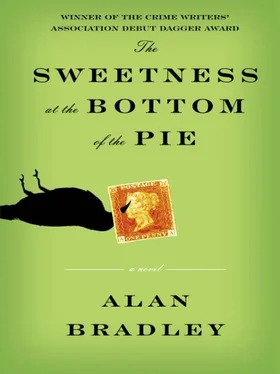Alan Bradley - The Sweetness at the Bottom of the Pie
Здесь есть возможность читать онлайн «Alan Bradley - The Sweetness at the Bottom of the Pie» весь текст электронной книги совершенно бесплатно (целиком полную версию без сокращений). В некоторых случаях можно слушать аудио, скачать через торрент в формате fb2 и присутствует краткое содержание. Жанр: Старинная литература, на английском языке. Описание произведения, (предисловие) а так же отзывы посетителей доступны на портале библиотеки ЛибКат.
- Название:The Sweetness at the Bottom of the Pie
- Автор:
- Жанр:
- Год:неизвестен
- ISBN:нет данных
- Рейтинг книги:3 / 5. Голосов: 1
-
Избранное:Добавить в избранное
- Отзывы:
-
Ваша оценка:
- 60
- 1
- 2
- 3
- 4
- 5
The Sweetness at the Bottom of the Pie: краткое содержание, описание и аннотация
Предлагаем к чтению аннотацию, описание, краткое содержание или предисловие (зависит от того, что написал сам автор книги «The Sweetness at the Bottom of the Pie»). Если вы не нашли необходимую информацию о книге — напишите в комментариях, мы постараемся отыскать её.
The Sweetness at the Bottom of the Pie — читать онлайн бесплатно полную книгу (весь текст) целиком
Ниже представлен текст книги, разбитый по страницам. Система сохранения места последней прочитанной страницы, позволяет с удобством читать онлайн бесплатно книгу «The Sweetness at the Bottom of the Pie», без необходимости каждый раз заново искать на чём Вы остановились. Поставьте закладку, и сможете в любой момент перейти на страницу, на которой закончили чтение.
Интервал:
Закладка:
I had once told this grimly amusing story to Feely.
"The need for heroines is generally to be found in the sort of persons who live in cottages," she had said with a haughty sniff.
But this was getting nowhere. My thoughts were all higgledy-piggledy, like straws in a haystack. I needed to find a catalyst of some description as, for example, Kirchoff had. He had discovered that starch boiled in water remained starch but when just a few drops of sulphuric acid were added, the starch was transformed into glucose. I had once repeated the experiment to reassure myself that this was so, and it was. Ashes to ashes; starch to sugar. A little window into the Creation.
I went back into the house, which now seemed strangely silent. I stopped at the drawing room door and listened, but there was no sound of Feely at the piano or of Daffy flipping pages. I opened the door.
The room was empty. And then I remembered that my sisters had talked at breakfast about walking into Bishop's Lacey to post Father the letters that each of them had written. Aside from Mrs. Mullet, who was off in the depths of the kitchen, and Dogger, who was upstairs resting, I was, perhaps for the first time in my life, alone in the halls of Buckshaw.
I switched on the wireless for company, and as the valves warmed up, the room was filled with the sound of an operetta. It was Gilbert and Sullivan's Mikado , one of my favorites. Wouldn't it be lovely, I had once thought, if Feely, Daffy, and I could be as happy and carefree as Yum-Yum and her two sisters?
"Three little maids from school are we,
Pert as a schoolgirl well can be,
Filled to the brim with girlish glee,
Three little maids from school!”
I smiled as the three of them sang:
"Everything is a source of fun.
Nobody's safe, for we care for none!
Life is a joke that's just begun!
Three little maids from school!”
Wrapped up in the music, I threw myself into an overstuffed chair and let my legs dangle over the arm, the position in which Nature intended music to be listened to, and for the first time in days I felt the muscles in my neck relaxing.
I must have fallen into a brief sleep, or perhaps only a reverie—I don't know—but when I snapped out of it, Ko-Ko, the Lord High Executioner, was singing:
"He's made to dwell
In a dungeon cell—”
The words made me think at once of Father, and tears sprang up in my eyes. This was no operetta, I thought. Life was not a joke that's just begun, and Feely and Daffy and I were not three little maids from school. We were three girls whose father was charged with murder. I leaped up from the chair to switch off the wireless, but as I reached for the switch, the voice of the Lord High Executioner floated grimly from the loudspeaker:
"My object all sublime
I shall achieve in time
To let the punishment fit the crime—
The punishment fit the crime…”
Let the punishment fit the crime. Of course! Flavia, Flavia, Flavia! How could you not have seen?
Like a steel ball bearing dropping into a cut-glass vase, something in my mind went click , and I knew as surely as I knew my own name how Horace Bonepenny had been murdered.
Only one thing more (well, two things, actually; three at most) were needed to wrap this whole thing up like a box of birthday sweets and present it, red ribbons and all, to Inspector Hewitt. Once he heard my story, he would have Father out of the clink before you could say Jack Robinson.
MRS. MULLET WAS STILL IN THE KITCHEN with her hand up a chicken.
"Mrs. M," I said, "may I speak frankly with you?"
She looked up at me and wiped her hands on her apron.
"Of course, dear," she said. "Don't you always?"
"It's about Dogger."
The smile on her face congealed as she turned away and began fussing with a ball of butcher's twine with which she was trussing the bird.
"They don't make things the way they used to," she said as it snapped. "Not even string. Why, just last week I said to Alf, I said, 'That string as you brang home from the stationer's—'"
"Please, Mrs. Mullet," I begged. "There's something I need to know. It's a matter of life and death! Please!"
She looked at me over her spectacles like a churchwarden, and for the first time ever in her presence, I felt like a little girl.
"You said once that Dogger had been in prison, that he had been made to eat rats, that he was tortured."
"That's so, dear," she said. "My Alf says I ought not to have let it slip. But we mustn't ever speak of it. Poor Dogger's nerves are all in tatters."
"How do you know that? About the prison, I mean?"
"My Alf was in the army too, you know. He served for a time with the Colonel, and with Dogger. He doesn't talk about it. Most of 'em don't. My Alf got home safely with no more harm than troubled dreams, but a lot of them didn't. It's like a brotherhood, you know, the army; like one man spread out thin as a layer of jam across the whole face of the globe. They always know where all their old mates are and what's happened to 'em. It's eerie—psychic, like."
"Did Dogger kill someone?" I asked, point-blank.
"I'm sure he did, dear. They all did. It was their job, wasn't it?"
"Besides the enemy."
"Dogger saved your father's life," she said. "In more ways than one. He was a medical orderly, or some such thing, was Dogger, and a good one. They say he fished a bullet out of your father's chest, right next to the heart. Just as he was sewin' him up, some RAF bloke went off his head from shell shock. Tried to machete everyone in the tent. Dogger stopped him."
Mrs. Mullet pulled tight the final knot and used a pair of scissors to snip off the end of the string.
"Stopped him?"
"Yes, dear. Stopped him."
"You mean he killed him."
"Afterwards, Dogger couldn't remember. He'd been having one of his moments, you see, and—"
"And Father thinks it's happened again; that Dogger has saved his life again by killing Horace Bonepenny! That's why he's taking the blame!”
"I don't know, dear, I'm sure. But if he did, it would be very like the Colonel."
That had to be it; there was no other explanation. What was it Father had said when I told him Dogger, too, had overheard his quarrel with Bonepenny? “That is what I fear more than anything.” His exact words.
It was odd, really—almost ludicrous—like something out of Gilbert and Sullivan. I had tried to take the blame to protect Father. Father was taking the blame to protect Dogger. The question was this: Whom was Dogger protecting?
"Thank you, Mrs. M," I said. "I'll keep our conversation confidential. Strictly on the q.t."
"Girl to girl, like," she said, with a horrible smirking leer.
The “girl to girl” was too much. Too chummy, too belittling. Something in me that was less than noble rose up out of the depths, and I was transformed in the blink of an eye into Flavia the Pigtailed Avenger, whose assignment was to throw a wrench into this fearsome and unstoppable pie machine.
"Yes," I said. "Girl to girl. And while we're speaking girl to girl, it's probably as good a time as any to tell you that we none of us at Buckshaw really care for custard pie. In fact, we hate it."
"Oh piff, I know that well enough," she said.
"You do?" I was too taken aback to think of more than two words.
"'Course I do. Cooks know all, they say, and I'm no different than the next one. I've known that de Luces and custard don't mix since Miss Harriet was alive.”
"But—"
"Why do I make them? Because Alf fancies a nice custard pie now and again. Miss Harriet used to tell me, 'The de Luces are all lofty rhubarbs and prickly gooseberries, Mrs. M, whereas your Alf's a smooth, sweet custard man. I should like you to bake an occasional custard pie to remind us of our haughty ways, and when we turn up our noses at it, why, you must take it home to your Alf as a sweet apology.' And I don't mind sayin' I've taken home a goodly number of apologies these more than twenty years past."
Читать дальшеИнтервал:
Закладка:
Похожие книги на «The Sweetness at the Bottom of the Pie»
Представляем Вашему вниманию похожие книги на «The Sweetness at the Bottom of the Pie» списком для выбора. Мы отобрали схожую по названию и смыслу литературу в надежде предоставить читателям больше вариантов отыскать новые, интересные, ещё непрочитанные произведения.
Обсуждение, отзывы о книге «The Sweetness at the Bottom of the Pie» и просто собственные мнения читателей. Оставьте ваши комментарии, напишите, что Вы думаете о произведении, его смысле или главных героях. Укажите что конкретно понравилось, а что нет, и почему Вы так считаете.












